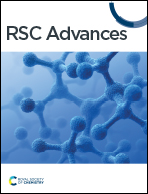Developing novel imidazoline-modified glucose derivatives as eco-friendly corrosion inhibitors for Q235 steel
Abstract
Many natural compounds and imidazoline derivatives have been previously evaluated as eco-friendly corrosion inhibitors for application in the food, pharmaceutical and chemical industries. Herein, a novel alkyl glycoside cationic imaginary ammonium salt (FATG) was designed via the grafting of imidazoline molecules into the skeleton of a glucose derivative, and its effects on the electrochemical corrosion behavior of Q235 steel in 1 M HCl were systemically investigated by electrochemical impedance spectroscopy (EIS), potentiodynamic polarization curves (PDP), and gravimetric measurements. The results indicated that its maximum inhibition efficiency (IE) was 96.81% at a concentration as low as 500 ppm. The adsorption of FATG on the Q235 steel surface followed the Langmuir adsorption isotherm. The scanning electron microscopy (SEM) and diffraction X-ray (XRD) results suggested the formation of inhibitor film on the metal surface, which significantly impeded the corrosion of Q235 steel. Additionally, FATG showed a high biodegradability efficiency (98.4%), which had great potential as a green corrosion inhibitor based on concepts of greenness and biocompatibility.



 Please wait while we load your content...
Please wait while we load your content...